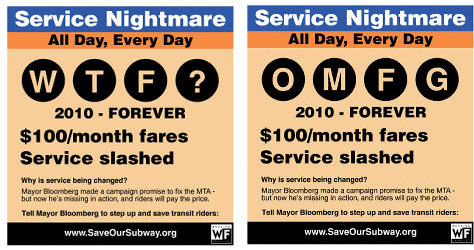“But Advertising is protected as Free Speech…” I hear this every once in a while. The problem is that advertising isn’t free speech, in more ways than one.
1. It’s far from free. You can go to any public place and say whatever you want. And anyone else can too. In the United States we’re pretty much covered on that. But you can’t advertise whatever you want in public space. Financially it’s out of reach. It takes an unreasonable amount of money to communicate your message through advertising that makes it inaccessible to all but a few citizens. Try to work outside the advertising spaces and you become a vandal. Ultimately, advertising is for private, business interests, not the public.
“But what if you can gather up the unreasonable amount of money?” you ask.
2. Even if you have the money, advertising spaces are not publicly accessible. The company has to approve your message. This gets all kinds of messed up. Here’s 3 quick examples:
a. In 2008, Suzanne Opton’s contract with a billboard company was canceled because the company didn’t want to display her portraits of active-duty soldiers. And she was ready to pay the $50,000 they agreed to in the contract.
b. Last year this WTF subway ad was rejected by the MTA because it conflicted with the MTAs interests:
The ad is targeted toward transit riders and is in the general interest. It’s target is not the MTA as much as Mayor Bloomberg. Yet still, it was rejected.
c. While the MTA decided the above ad was not acceptable, just this week, in a controversial move, the MTA decided this ad is acceptable and it is running on trains now:
(Excuse the fact that I’m sidestepping the disgusting, semi-racist, anti-Islamic, pseudo logic in this ad because Jeffery Goldberg nailed it already and I’m trying to make a separate point.)
Private interests are making judgment calls on what falls under the 1st Amendment. It doesn’t matter what the courts would say when the gatekeepers to the discourse won’t supply access. While I find the above “Why There?” ad simple minded and counter-productive, it would be great if I could enter the dialogue on a level playing field – where I don’t have to have tens of thousands of dollars to buy in to the debate.
We can’t depend on businesses to uphold and defend our rights. Business argues that advertising is Free Speech protected by the Constitution so they can broadcast their message, but make no mistake, they’re not interested in the free speech, freedom of ideas, equal access, and open discussion and debate that culture and our democracy needs. They’re simply interested in getting their sales messages into your brain.
Here’s a thought from Paul Sachelari, Anti-Advertising Agency Legal Counsel:
Of course, the First Amendment, as any grade school kid will tell you, is the right to free speech enshrined in the Constitution. However, the right is not absolute, but rather elastic. It applies absolutely to some speech and less so to others. The most protected is political speech, while commercial speech requires much less deference.
What do you think?



One Comment
I couldn’t have said it any better myself. Thank you.